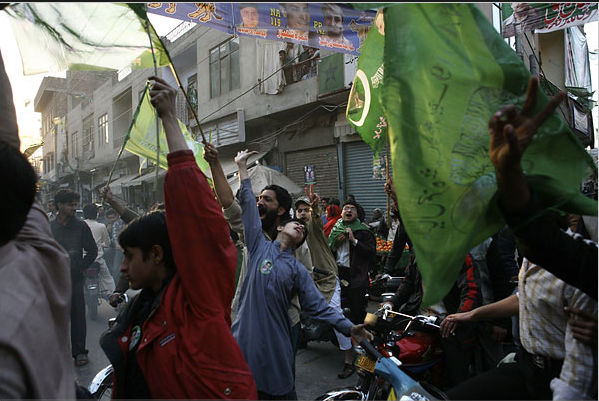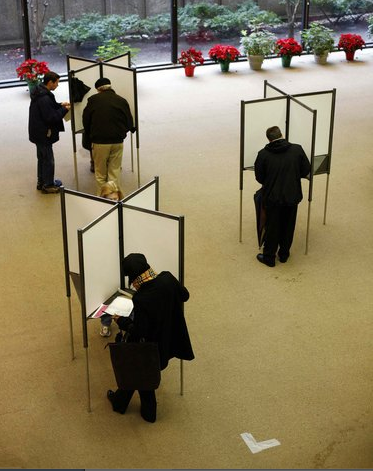Every year or so at election time we are reminded of how apathetic American voters are by one or another group that calls attention to the low U.S. voter turnout in comparison to other countries. The antidote to this condition is to be “rational,” for voting, we are told, is the rational thing to do: every vote can make a difference, by voting you have a voice in the political, use it or lose it, and so on. The problem, of course, is that no matter how rational it is to be rational, few of us live our lives exclusively by the standards of such a calculus (even when we can figure out what the rational thing to do is!). The question then, perhaps, is not why do so few people vote, but in fact why do so many actually choose to go to the polls?
One possibility, of course, is that voting is altogether irrational, contrary to one’s best interests according to a carefully calculated cost-benefit analysis. A different answer is suggested in this photograph that appeared in the NYT this past week following the parliamentary elections in Pakistan.
Voting in this election might have been the rational thing to do, although the caption points out that those going to these polls did so “fearful of violence,” but what the photograph features is a moment of unfettered, collective joy and celebration. The figure dancing in the middle is a cipher of almost pure affect, channeling the emotion that courses up and down the street. This election is about more than aggregating personal preferences: in the process citizens have become part of something that is larger than individual self-consciousness. The joy of voting here is an almost transcendent act; it is not inconsistent with a rational appeal to aggregate one’s votes and thus gain the power of numbers, but it is clearly more than that—a ritual of social life and collective being.
In the U.S., of course, we worry a good deal about the influence of such demonstrations of public affect on the voting process. And so while political campaigns themselves seem to be acceptable occasions for public spectacles, parades, and overt displays of collective emotionality, voting itself is rendered as an individual and isolated moment of private reflection. This photograph from this past week’s Washington Post is typical of how the voting process is ritualistically represented by the mainstream media:
Nameless and faceless individuals visually and physically segregate themselves from the influences of the public as they register their voice and opinion guided by nothing by conscience—and, presumably, rationally calculated private interest. Indeed, there are no signs of the public whatsoever, a point underscored by the high angle and long distance of the image that would ordinarily contextualize the setting in a public space, but here only emphasizes the stark, drab, emptiness of the room which could be anywhere—and nowhere. Note too how the image highlights the fragmentation and separation of private individuals. What the picture shows us then is a scene that symbolically underwrites the autonomous individuality featured in contemporary liberal-democracy, and one that mutes the affect or joy that goes along with being members of a community of strangers. Good reasons aside, it is little wonder so many people choose not to vote.
Photo Credits: Tyler Hicks/NYT; Shannon Stapleton/Reuters


And, yet, every once in a while something out of the ordinary tends to happen here, as well: http://williamwolff.org/composingspaces/students-march-73-miles-to-vote/
Bill: Thanks for this. But, of course, as your post and the accompanying story make clear, it is rather the exception that proves the “rule.” And, of course too, I don’t recall it being picked up and covered by the mainstream media or in anything like a national context. Such events happen but we don’t feature them.
I think both of these pictures say alot of how culturally we approach ellecitons. Here in the U.S. it is very private to vote as you demonstrated in your second picture. As your blogs says many of us take voting from granted, the right to vote, the right to celebrate such liberty. In compare to the first image whereas the celebration of voting is differently embeded on their culture. I can definitely see that to look at this picture we have to some historical context as to why Pakistan’s elections are seeing as a celebration. We have to have a bit understanding of Pakistan’s politics. It helps us also understand why here in the U.S. we take such a vital right for granted.